by Deep Green Resistance News Service | Aug 4, 2017 | Obstruction & Occupation
Featured image: Munduruku warriors gather at the São Manoel hydroelectric dam site. Courtesy Caio Mota/Centro Popular do Audiovisual/Forum Teles Pires via internationalrivers.org
Munduruku await for government to comply with their promises or they will return to halt construction again
by Rick Kearns / Indian Country Today Media Network
Indigenous activists shut down construction of a massive dam project in Brazil for four days in July and received assurances from officials that their demands for halting construction of the dam, prior consultation, land rights and return of sacred funerary urns would be met.
The Munduruku activists had occupied the São Manoel hydroelectric dam site on the Teles Pires River that borders the states of Pará and Mato Grosso in the Brazilian Amazon. The São Manoel project is part of a larger effort to create a complex of five hydroelectric facilities in Brazil.
Lead by women warriors, a group of 200 Munduku men, women and children occupied the site on Sunday, July 16. The Munduruku and their allies stated that the project had already destroyed sites sacred to the Munduruku and other Indigenous Peoples. They chose to occupy the site to halt construction after previous protests and outreach failed to stop the project or cause the officials to return funerary urns which had been stolen during the building process.
The activists agreed to leave after a meeting with representatives from FUNAI, the Federal Prosecutor’s Office (MPF), and the São Manoel and Teles Pires dam consortiums on July 19. The officials agreed to meet the demands presented by the Munduruku.
On July 21, Munduruku leaders announced that they would leave. “We Munduruku are returning to our villages, with the protection of the spirits of our ancestors. FUNAI [Brazil’s federal agency for Indigenous issues] has heard our demands and the companies made a commitment to our agenda. We will continue our movement. If they do not fulfill the commitment they made, FUNAI and the company can expect our return,” according to the Munduruku press statement titled We Are Made of the Sacred.
The list of demands that the government and corporate officials acceded to include the following:
- The completion of land titling for the Munduruku territories of Sawre Muybu, Pontal dos Isolados, Sawre Jaybu and Sawre Apompu.
- Independent studies on the socio-environmental and cultural impacts of dams on the Teles Pires River, with active participation of indigenous communities and experts indicated by them.
- That any approval of the São Manoel dam be based on the rule of law and independent technical evaluations of impacts on rivers, fish and the livelihoods of Indigenous Peoples.
- That the mitigation and compensation plans for the Teles Pires and São Manoel hydroelectric dam projects be revised to guarantee transparency and full participation of Indigenous Peoples.
- That future projects protect the collective historical and cultural heritage of Indigenous Peoples of the Teles Pires, and that funeral urns be returned to a sacred site, determined by the Munduruku people, for permanent storage and protection.
- Guarantee of Free, Prior and Informed Consent, in accordance with the Munduruku consultation protocol, for future proposed projects that directly or indirectly impact upon Indigenous Peoples.
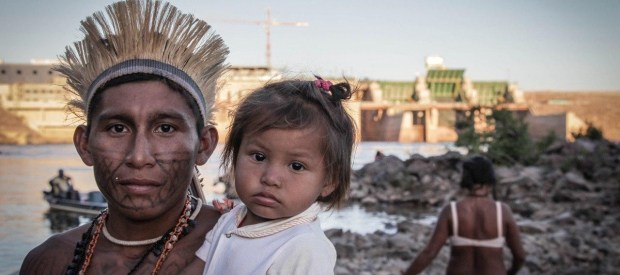
by Deep Green Resistance News Service | Jul 20, 2017 | Obstruction & Occupation
by International Rivers and Amazon Watch / via Intercontinental Cry
At dawn on Sunday, July 16th, 200 representatives of the indigenous Munduruku nation occupied the main work camp of the São Manoel hydroelectric dam on the Teles Pires River in the Brazilian Amazon, paralyzing the project. Led by Munduruku women warriors, the occupiers presented a series of demands to dam developers and Brazilian government authorities, including the right to consultation, land titling, and respect for their cultural and spiritual sites. They also demanded that developers repair the grave environmental destruction inflicted by dams on the Teles Pires.
In an open letter, the Munduruku state: “Our sacred places [such as the Sete Quedas waterfall and burial grounds] were violated and destroyed. Our ancestors are crying… The Teles Pires and Tapajós Rivers are dying. Our rights, guaranteed by the Federal Constitution, which came to exist after much indigenous blood was spilled, are being violated.”
The letter emphasizes that construction of the São Manoel and Teles Pires hydroelectric dams, both located in close proximity to indigenous territories occupied by the Munduruku, Kayabi and Apiaka tribes, constitute a gross violation of the right of indigenous peoples to Free, Prior, and Informed Consent (FPIC), guaranteed by International Labor Organization’s Convention 169, to which Brazil is a signatory. In an effort to support FPIC implementation, in 2014 the Munduruku published a ‘protocol’ in which they laid out guidelines for an appropriate process of prior consultation and consent for proposed projects that would affect their livelihoods and rights. Though they formally presented it to the Brazilian government in 2015, they have yet to receive a reply.
Together with the destruction of the Sete Quedas waterfalls – a site considered to be the center of cosmology for the region’s three indigenous peoples – dams on the Teles Pires River also led to the removal of funerary urns and archeological artefacts on Munduruku burial grounds. Long a major concern of Munduruku leadership, the return of these items is among the principal demands of the occupation.
“I am deeply saddened to be witnessing the destruction of our sacred sites,” said Maria Leusa Kabá Munduruku, one of the principal leaders of the occupation. “We women need to have great strength to cure the pains we are feeling here.”
Now entering its third day, the occupation of the São Manoel dam was conceived by Munduruku women who identified the need to take bold action to stop the ongoing destruction of indigenous rights and territories in the Tapajós River basin.
“After we heard the Munduruku women, it was decided that we would gather peacefully at the São Manoel work camp, motivated by our pain,” says the Munduruku statement. “We are not here to invade. The only invader is the government and the companies responsible for the dams being built on the Teles Pires…. We know that our struggle is legitimate… We ask that our demands be met and will not leave here until they are.”
In response to the indigenous mobilization and work stoppage at São Manoel, members of the dam’s consortium, EESM – composed of the Brazilian affiliate of the China Three Gorges Corporation (CTG); Portugal’s EDP Energias do Brasil; and Furnas, a state-run energy company – filed suit in federal court to end the occupation. The Munduruku countered with a second statement, attesting to their determination to engage in dialogue and to remain on site, resisting efforts to intimidate them. “We only need for our demands to be attended to. Our protest is peaceful and therefore the intervention of the national guard or federal police is not necessary.”
In its only proactive response to Munduruku demands, the government agreed to send the president of the indigenous agency, FUNAI, to visit the occupation site. The Munduruku are skeptical, however, particularly given that FUNAI’s current president, Franklimberg Ribeiro de Freitas, is a highly controversial appointee of Brazil’s right-wing Social Christian Party, which has proved antagonistic to indigenous rights. “It is not enough for him to come here with false promises,” read a Munduruku statement. “We want concrete responses to our needs.”
“Far from the limelight of high-profile, controversial projects like Belo Monte, the São Manoel and Teles Pires dams have involved a series of human rights violations and environmental illegalities since their inception,” said Brent Millikan of International Rivers – Brazil. “The consequences of this steamrolling of the rule of law have included the destruction of sacred sites and devastating downstream impacts on water quality, freshwater ecosystems and fisheries that are essential for the livelihoods of indigenous peoples.”
“The Munduruku occupation demonstrates the extent to which Brazil’s indigenous and traditional peoples must go to make themselves heard,” said Christian Poirier of Amazon Watch. “This a struggle for cultural survival in opposition to a disastrous pattern of environmental destruction and rights violations endemic to Brazil’s Amazon dam-building program.”
The São Manoel and Teles Pires dams are part of a complex of four large hydroelectric projects simultaneously under construction on the Teles Pires River, a major tributary of the Tapajós River in the Brazilian Amazon. The dams were planned by the state-run energy company Eletrobras and the Energy Planning Institute (EPE), both affiliated with the Brazilian Ministry of Mines and Energy. The socio-environmental risks of this dam cascade in the Amazon, including violation of indigenous rights, were systematically underestimated or simply ignored. Environmental licenses and public funding from Brazil’s National Development Bank (BNDES) were approved under intense political pressure.
Investors such as CTG and Iberdrola, a Spanish pension fund, repeatedly ignored warning signs of the projects’ legal, financial and reputational risks. Recently, the CTG-led São Manoel consortium informed indigenous peoples of the Teles Pires River that the closing of floodgates and filling of the dam’s reservoir would begin in August, despite the fact that no such license has been issued by IBAMA, the federal environmental agency. Although dam construction began in 2014, a plan to mitigate and compensate impacts of the São Manoel dam, which should have preceded construction, has yet to receive final approval from FUNAI and indigenous tribes.
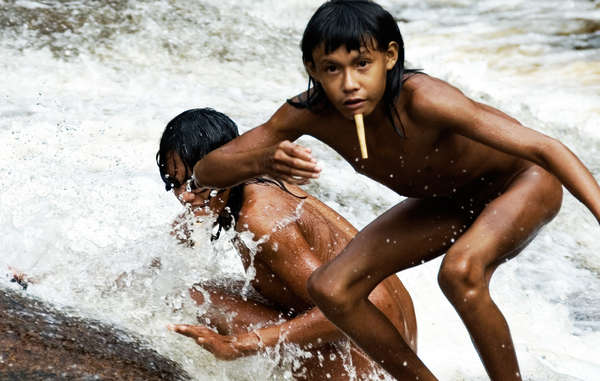
by Deep Green Resistance News Service | Jul 14, 2017 | Colonialism & Conquest
Featured image: The Zo’é are a very isolated tribe, who were forcibly contacted in the 1980s. Many of them died of diseases to which they had no resistance. © Fiona Watson/Survival International
by Survival International
29 indigenous organizations from across South America have come together in Brazil to slam governments for failing to protect the lives and lands of uncontacted tribes – a situation they say is tantamount to genocide.
Representatives from tribes in Brazil, Peru, Colombia, Paraguay, and Venezuela, attended the large conference hosted by the Brazilian organization CTI in June 2017.
The conference condemned the “exponential increase” in violence against indigenous people across the continent and described failures to properly protect the territory of uncontacted tribal peoples as genocide.
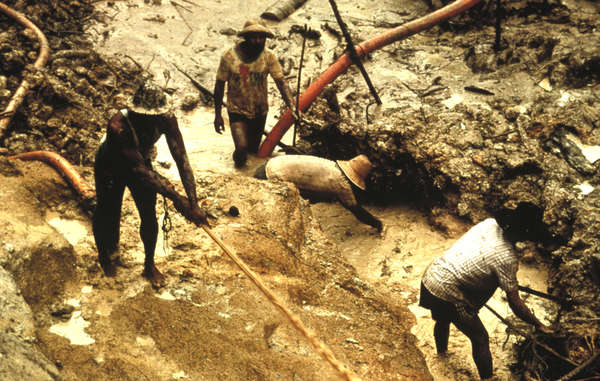
Gold miners devastated the Yanomami between the 1980s and 1990s, and still present a genocidal threat to uncontacted members of the tribe. © Colin Jones/Survival
Brazil has recently been under fire for cuts to its indigenous affairs agency, FUNAI. These cuts, especially those affecting teams of agents who protect uncontacted tribal territories, leave uncontacted peoples dangerously exposed to violence from outsiders, and diseases like flu and measles to which they have no resistance.
The country is unusual in having had two genocide convictions in its courts: both for crimes against indigenous peoples. The UN genocide convention was signed 69 years ago in December 1948.
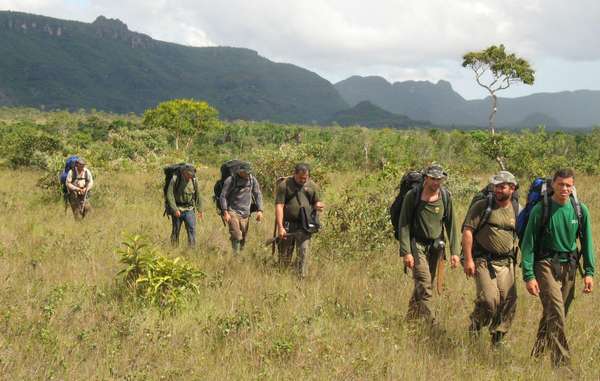
FUNAI agents on a patrol. Teams like this are vital to protecting indigenous territories, but their funding is being cut by the Brazilian government. © FUNAI
A Brazilan senator is proposing a new bill in Brazil’s congress which would designate all unauthorized entry into uncontacted tribes’ lands as a breach of the country’s “genocide law” – aimed at protecting uncontacted peoples. However, campaigners fear that the current government’s close ties to the corrupt agribusiness lobby could hinder efforts to create more robust protections.
The senator, Jorge Viana, is from Acre state, which is home to many uncontacted tribes, and also people like the Sapanawa, who were forced to make first contact in 2014.
All uncontacted tribal peoples face catastrophe unless their land is protected. Survival International is committed to securing their land for them, and giving them the chance to determine their own futures.
by Deep Green Resistance News Service | Jun 19, 2017 | Colonialism & Conquest
by UN Human Right Office of the High Commissioner
GENEVA / WASHINGTON DC – Three United Nations experts and a rapporteur from the Inter-American Commission on Human Rights have joined forces to denounce attacks on indigenous and environmental rights in Brazil.
“The rights of indigenous peoples and environmental rights are under attack in Brazil,” said the UN Special Rapporteurs on the rights of indigenous peoples, Victoria Tauli Corpuz, on human rights defenders, Michel Forst, and on the environment, John Knox, and the IACHR Rapporteur on the Rights of Indigenous Peoples Francisco José Eguiguren Praeli.
Over the last 15 years, Brazil has seen the highest number of killings of environmental and land defenders of any country, the experts noted, up to an average of about one every week. Indigenous peoples are especially at risk.
“Against this backdrop, Brazil should be strengthening institutional and legal protection for indigenous peoples, as well as people of African heritage and other communities who depend on their ancestral territory for their material and cultural existence,” the experts stated. “It is highly troubling that instead, Brazil is considering weakening those protections.”
The experts highlighted proposed reforms to the National Indian Foundation (FUNAI), the body which supports indigenous peoples in the protection of their rights, and which has already had its funding severely reduced. A report recently adopted by the Congressional Investigative Commission calls for the body to be stripped of responsibility for the legal titling and demarcation of indigenous lands. The experts were also concerned with allegations of illegitimate criminalization of numerous anthropologists, indigenous leaders and human rights defenders linked to their work on indigenous issues.
“This report takes several steps back in the protection of indigenous lands,” the experts warned. “We are particularly concerned about future demarcation procedures, as well as about indigenous lands which have already been demarcated.”
The Congressional Investigative Commission’s report also questions the motives of the United Nations, accusing it of being a confederation of NGOs influencing Brazilian policy through its agencies, the ILO Convention 169, and the UN Declaration on the Rights of Indigenous Peoples.
“The report also states that the UN Declaration presents a grave threat to Brazil’s sovereignty, and it further encourages the Brazilian government to denounce ILO Convention 169, claiming it manipulates the establishment of non-existent indigenous peoples in order to expand indigenous lands in Brazil,” the experts stressed.
“It’s really unfortunate that instead of exemplifying the principles enshrined in the Declaration, the Congressional Investigative Commission questions the motives behind it and those of the UN itself, and waters down any progress made so far,” they said.
Ms. Tauli Corpuz expressed particular alarm at accusations that her 2016 visit to Brazil intentionally triggered an increase in the number of indigenous peoples reclaiming their lands, exposing them to further violence. She highlighted the fact that some of these communities suffered attacks immediately following her mission.
The human rights experts also noted that a number of draft laws establishing general environmental licensing that would weaken environmental protection were being circulated in Congress on Friday 2 June. For example, the proposed legislation would remove the need for environmental licenses for projects involving agri-business and cattle ranching, regardless of their size, location, necessity, or impact on indigenous lands or the environment.
“Weakening such protections would be contrary to the general obligation of States not to regress in the level of their protections of human rights, including those dependent on a healthy environment,” they stressed.
The experts warned that the proposed laws were at odds with the American Declaration on the Rights of Indigenous Peoples, which guarantees the rights of indigenous peoples to the conservation and protection of the environment, and protects the productive capacity of their land and resources.
Both the report and the draft legislation had been submitted by members of the “ruralist” lobby group, a coalition representing farmers’ and ranchers’ associations, the experts noted.
“Tensions over land rights should be addressed through efforts to recognize rights and mediate conflicts, rather than substantially reducing the safeguards in place for indigenous peoples, people of African descent and the environment in Brazil,” they said.
The UN experts are in contact with the Brazilian authorities and closely monitoring the situation.
Ms. Victoria Tauli-Corpuz, Special Rapporteur on the rights of indigenous peoples, Mr. Michel Forst, Special Rapporteur on the situation of human rights defenders, and Mr. John H. Knox, Special Rapporteur on the issue of human rights obligations related to the enjoyment of a safe, clean, healthy and sustainable environment are part of what is known as the Special Procedures of the Human Rights Council. Special Procedures, the largest body of independent experts in the UN Human Rights system, is the general name of the Council’s independent fact-finding and monitoring mechanisms that address either specific country situations or thematic issues in all parts of the world. Special Procedures’ experts work on a voluntary basis; they are not UN staff and do not receive a salary for their work. They are independent from any government or organization and serve in their individual capacity.
Mr. Francisco José Eguiguren Praeli, Rapporteur on the rights of indigenous peoples of the Inter-American Commission on Human Rights, was elected on June 16, 2015, by the OAS General Assembly, for a 4-year mandate ending December 31, 2019. A principal, autonomous body of the Organization of American States (OAS), the IACHR derives its mandate from the OAS Charter and the American Convention on Human Rights. The Inter-American Commission has a mandate to promote respect for human rights in the region and acts as a consultative body to the OAS in this area. The Commission is composed of seven independent members who are elected in an individual capacity by the OAS General Assembly and who do not represent their countries of origin or residence.
UN Human Rights, country page: Brazil
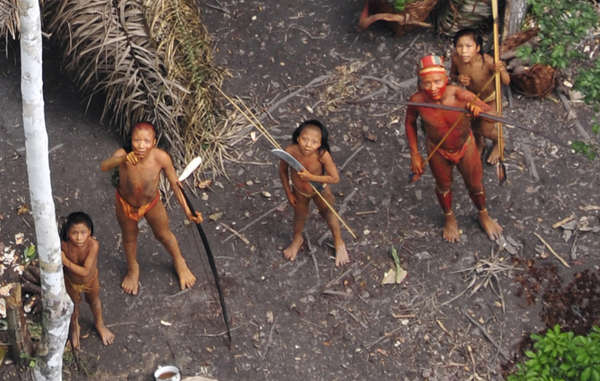
by Deep Green Resistance News Service | Jun 10, 2017 | Colonialism & Conquest
Featured image: The UN has condemned Brazil’s onslaught on indigenous rights, which threatens to wipe out uncontacted tribes © G. Miranda/FUNAI/Survival International
by Survival International
The United Nations and the Inter-American Commission on Human Rights have condemned Brazil’s “attack” on its indigenous peoples.
In a new statement, UN and IACHR experts have warned that Brazilian Indians are at great risk as politicians continue pushing to weaken their hard-won land rights.
Brazil’s constitution states that indigenous territories must be mapped out and protected for the Indians’ exclusive use. But anti-indigenous politicians linked to Brazil’s powerful agribusiness lobby are calling for changes to the law which could enable them to steal and destroy these lands for large-scale plantations and “development” projects. This is the most serious attack Brazilian Indians have experienced in decades.
Without their lands, indigenous peoples cannot survive. Tribes nationwide have united in protest against this onslaught on their rights. One indigenous leader, Adalto Guarani, said that the politicians’ plans “are like an atomic bomb… which could kill all the Indians in Brazil” and has called for people around the world to take action.
Brazil is home to over 250 tribes, including over 100 who are uncontacted and reject contact with mainstream society. Uncontacted tribes are the most vulnerable peoples on the planet. They face genocide and will be killed by disease and violence brought by invaders if their land is not protected, but the teams charged with keeping outsiders away are paralyzed by recent budget cuts.
The statement slams the “illegitimate criminalization” of indigenous peoples’ allies. The anti-indigenous agribusiness lobby instigated an inquiry whose recently published report attacked indigenous leaders, anthropologists, public prosecutors and NGOs, including Survival International. The report was met with outrage and incredulity in Brazil and beyond.
The experts also highlighted that over the last 15 years, Brazil has seen “the highest number of killings of environmental and land defenders of any country”. Dozens of indigenous leaders have been assassinated in recent years, following attempts to reoccupy their ancestral land, and last month, thirteen Gamela Indians were hospitalized after a violent attack by men armed with machetes in the Amazon.
The UN and the IACHR have recommended that “Brazil should be strengthening institutional and legal protection for indigenous peoples”.
Survival has launched a campaign to defend indigenous rights in Brazil.





